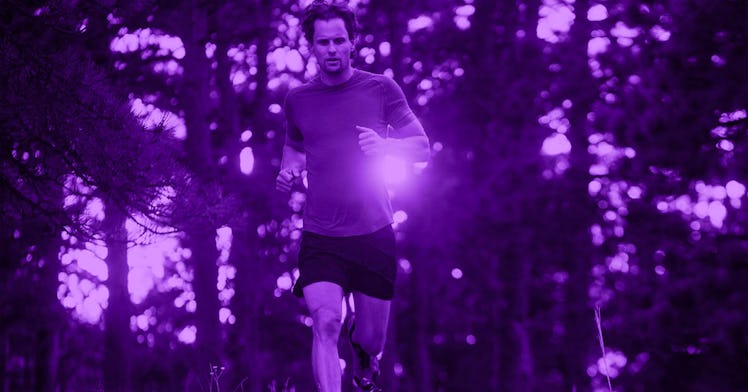What I Learned From Ultramarathons Can Help Teach Kids to Embrace Uncertainty
Competing in ultramarathons has taught me some lessons that can help kids understand what we're living through right now.

People who were hoping the fall of 2021 would mark a long-awaited return to “normalcy” are finding themselves sorely disappointed. COVID infections and deaths have risen, with the Delta variant ushering in what the CDC director called a “pandemic of the unvaccinated.” Environmental disasters, meanwhile, have added to the upheaval.
All of this uncertainty can have a profound effect on our kids, of course. It shapes some of their emotional experiences, their development, and the ways they view the world. As a clinical psychologist explained to Fatherly’s Donna Freydkin last year, the job of parents is not to provide certainty, but to “help kids tolerate the uncertainty.”
The biggest way we do this is by setting an example. What we do is far more impactful than what we say. But it isn’t easy to grapple with constant uncertainty ourselves. Fortunately for me, unusual experiences taught me to not just deal with, but even embrace the unknown.
A decade ago, I took on my first Racing the Planet event. It was a week-long 250km (155 mile) race across the Sahara. Despite lots of training and high hopes, I didn’t make it, collapsing partway through. I learned then that no amount of planning can prepare you for everything you may face.
When I took part the next year, this time to traverse the Mongolian desert, it wasn’t just with additional training under my belt. It was with a whole new perspective as well. Above all else, I credit that perspective with allowing me to complete the race and those I’ve done since, from thick snow and ice in Antarctica to volcanic rock in Iceland to the Andes Mountains of Patagonia — my last before my daughter was born.
Throughout the pandemic, fellow ultramarathoners and I have been talking about the lessons we learned, and how well they helped prepare us for what we’re all living through now.
1. Redefining ‘Growth Mindset’
People often talk about the importance of a “growth mindset,” but ultramarathons give you a whole new appreciation for the term. Rather than facing each day with the goal of navigating your path based on what you’ve learned in the past, you face each day wondering what you will learn that day — and how learning it may help you achieve your goals, discover your own capabilities, and grow as a person.
People have a natural tendency to want to feel prepared and ready for whatever comes our way. But when we instead tell ourselves that we’ve prepared all we can and that there are some things we simply can’t prepare for, we see each day as more of an adventure. It’s okay to not be in control of your situation, because learning is exciting. I love telling my daughter stories of things I learned that day while out “adventuring” in New York City finding new outdoor places to set up and get work done, like a park bench.
2. Listening Is a Life Skill
No one has all the answers in any situation. So it’s important to build meaningful relationships with people around us and learn from them. Listening with curiosity and empathy is one of the most important life skills.
Amid our exhausting treks, Racing the Planet participants shared ideas, supported each other, and came to see that everyone had unique challenges and strengths. During the pandemic, I’ve been doing the same with people I work with (remotely for now) and those I interact with socially.
I teach my daughter that even a simple conversation with a friend at school about what games they like to play may help give her ideas about something she wants to try, and vice versa. Or that her teacher might have a great idea about how to make mask-wearing extra fun. Even brief conversations can give you all sorts of new inspirations.
3. Appreciate self-discovery
One thing we had plenty of during ultramarathons was time to think. But in normal life these days, many people don’t give themselves enough time for that. It’s more tempting to pick up a device and distract yourself with screens than to take quiet time alone.
While some zoning out with entertainment can be helpful, and reading time is important (my daughter and I do so together every night), you also need to spend time thinking without external inputs. I go for daily walks to do this, and I make sure my daughter knows. She, meanwhile, likes to play dress up, pretending to create her own kingdoms — the kind of quiet play that researchers say helps life lessons to seep in.
By building time like this into her day now, I hope to make quiet time for introspection a habit in her life going forward. It’s during these moments that you discover how you’ve grown and what you’ve overcome. That helps you feel much better about the uncertainty ahead, because you know you’ll be able to handle it.
The future is a blank slate, full of things you can’t control. But you get to decide what you wish to do. Have faith in your tenacity and your ability to learn and navigate whatever comes along. When you do, you’ll feel the confidence and energy to face just about anything — whether it’s a massive mountain or a long stretch of the pandemic.
Colin Nanka is vice president of global sales leader coaching at Salesforce. His mini-documentary about Racing the Planet, Defeating Average, is available on YouTube and OutsideTV.